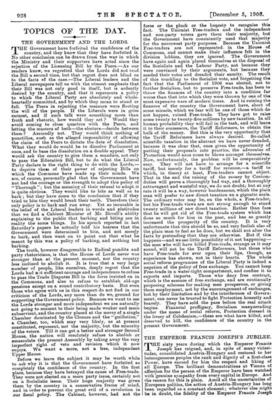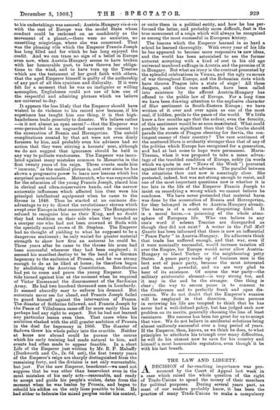THE EMPEROR FRANCIS JOSEPH'S JUBILEE.
THE sixty years during which the Emperor Francis Joseph has reigned, and, in spite of many vicissi- tudes, consolidated Austria-Hungary and restored to her heterogeneous peoples the rank and dignity of a first-class Power, have earned for him the respect and liking of all Europe. The brilliant demonstrations at Vienna of affection for the person of the Emperor have been watched with 'genuine sympathy from every capital in Europe. And the reason for this is plain. Amid all the uncertainties of European politics, the action of Austria-Hungary has long been regarded as a constant element ; whatever else might be in doubt, the fidelity of the Emperor Francis Joseph to his undertakings was assured; Austria-Hungary vis-a-vis with the rest of Europe was the model State whose conduct could be reckoned on as confidently as the movement of a planet,—there were no anxieties, no -unsettling misgivings, where she was concerned. That was the pleasing role which the Emperor Francis Joseph has long filled and for which he has long enjoyed the :credit. And we can trace no sign of a belief in Europe :even now, when Austria-Hungary seems to have broken • with her honourable past, to have thrown her obliga- -lions to the wind, and to have• torn up the Treaties ,which are the testament of her good faith with others, that the aged Emperor himself is guilty of the authorship of any part of all this cynicism and disloyalty. If it were felt for a moment that he was an instigator or willing laccomplice, Englishmen could not use of him one of the respectful and admiring phrases which we believe are universal to-day.
" It appears the less likely that the Emperor should have 'wished to do violence to his record now because, if his experience has taught him one thing, it is that high- handedness leads generally to disaster. We believe rather —is it not almost an open secret ?—that the Emperor was over-persuaded in an unguarded moment to consent to the annexation of Bosnia and Herzegovina. The untold complications created by that. act were not even dimly foreseen by him, and probably even his advisers had no notion that they were stirring a hornets' nest, although we do not suggest that ignorance should be held in any way to palliate wantonness. The Emperor was inocu- lated against many mistakes common to Monarchs in the first twenty years of his reign. Those events made him " immune, ' as the medical phrase is, and ever since he has shown a progressive power to learn new lessons which has surprised most onlookers. Metternich, who was responsible for the education of the young Francis Joseph, placed him in clerical and ultra-conservative bands, and the narrow autocratic influences which affected him then were his principal intellectual equipment when he came to the throne in 1848. Thus he started at an ominous dis- advantage to try to direct the revolutionary storms which swept over Europe in that memorable v The Hungarians refused to recognise him as their King, and no doubt ' they had tradition on their side when they branded as a usurper one who had not been crowned at Buda with the specially sacred crown of St. Stephen. The Emperor had no thought of yielding to what he supposed to be a dangerous sentiment ; he only waited for greater material strength to show bow firm an autocrat he could be. Three years after he came to the throne his arms had been successful wherever they had been employed ; it seemed his manifest destiny to be the head of a German hegemony to the exclusion of Prussia, and he was strong enough to do as he liked at home ; he therefore began by abolishing the Austrian Constitution. Retribution had yet to come and prove the young Emperor. The tide turned against him at the moment when he required of Victor Emmanuel the disarmament of the Sardinian Army. He had two hundred thousand men in Lombardy. It seemed absurdly easy to enforce his demand. But autocrats never see far ahead, and Francis Joseph failed to guard himself against the intervention of France. The disaster of Solferino followed, and Francis Joseph by the Peace of Villafranca came off far more easily than he perhaps had any right to expect. But he had not learned any particular lesson even then. That came when his • ambition clashed with the still greater ambition of Prussia in the duel for hegemony in 1866. The disaster of Sadowa threw his whole policy into the crucible. Neither at home nor abroad could he pursue the course which his early training had made natural to him, and events had often made to appear feasible. In a short Life of the Emperor just written by Mr. R. P. Mahaffy (Duckworth and Co., 2s. 6d. net), the first twenty years of the Emperor's reign are sharply distinguished from the • remaining forty, and the division is not wily warrantable, but just. For the new Emperor, beneficent—we need not suppose that he was other than benevolent even in the most mistaken of his early acts—reasonable, and ready to accept and guide his people's wishes, dates from the moment when he was beaten by Prussia, and began to • rebuild his edifice on the only lines possible to him. He , had either to federate the mixed peoples under his control, or unite them in a political entity, and how he has per- formed the latter, and probably more difficult, feat is the true monument of a reign which will always be recognised as among the most successful in European history.
The lessons which the Emperor learned in so hard a school he learned thoroughly. With every year of his life he has appeared to become more responsive to new ideas, and the world has been astonished to see the former autocrat accepting with a kind of zest in his old age universal manhood suffrage in Austria and the promise of it in Hungary. But what an irony is the contrast presented by the splendid celebrations in Vienna, and the ugly rumours of war throughout Europe, and the Bohemian riots which have thrown Prague into a state of siege ! All these dangers, and these race conflicts, have been called into existence by the affront Austria-Hungary has offered to the public law of Europe. For a long time we have been drawing attention to the explosive character of Slav sentiment in South-Eastern Europe ; we have written of it over and over again as one of the most real, if bidden, perils to the peace of the world. We little knew a few months ago that the ardour, even the ferocity, of this sentiment would be so soon manifested. What could possibly be more significant than that the Czechs should parade the streets of Prague cheering for Servia, the con- tingent enemy of their country ? The race sentiment of the scattered Slays is evidently stronger than that of any of the polities which Europe has recognised for a generation, and had at last come to hope were permanent. Maria- Theresa, when it was proposed to take a mean advan- tage of the troubled condition of Europe, nobly (in words which we quote in our "News of the Week ") protested against the cynicism of her advisers. The parallel between the situations then and now is amazingly close. She protested, indeed, but was not strong enough to resist, and one of the most important questions now is whether it is too late in the life of the Emperor Francis Joseph to insist on remedying a wrong which we cannot believe he condones. We have never pretended that material harm was done by the annexation of Bosnia and Herzegovina, for they belonged in effect to Austria-Hungary already. The harm is of a. much more disquieting kind. It is a moral harm,—a poisoning of the whole atmo- sphere of European life. Who can believe in any one's word if solemn Treaties are disregarded as though they did not exist? A writer in the Pall Mall Qazette has been informed that there is now an influential "Peace Party" in Austria-Hungary. Its adherents think that trade has suffered enough, and that war, even if it were nominally successful, would increase taxation all over the Empire, for Europe would never allow Austria- Hungary to bleed Turkey or the neighbouring petty States. A peace party made up of business men is the best sort of peace party, because the most interested and the most powerful, and we are very glad to hear of its existence. Of course the war party—the military aristocratic element—is very strong too, and. it may in the end be the stronger. One thing is clear ; the way to secure peace is to consent to the Conference and to perfectly frank and open dis- cussion. We do not doubt that the Emperor's suasion will be employed in that direction. Some persona in reviewing his life are tempted to think that he has never had a well-defined policy, but has judged each new problem on its merits, generally choosing the line of least resistance. His success has been too great for us to accept that view. We do not believe in accidental solutions being almost uniformly successful over a long period of years. If the Emperor, then, knows, as we think he does, to what principles to attribute his triumph over many difficulties, he will do his utmost now to save for his country and himself a most honourable reputation, even though it be with his last breath.







































































 Previous page
Previous page